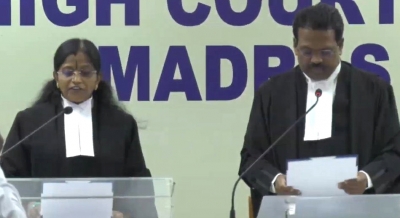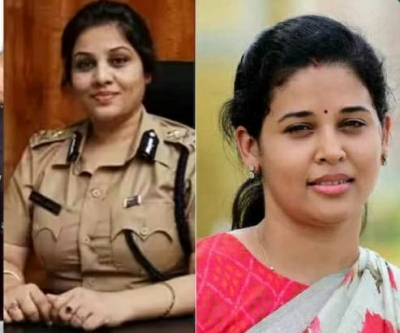 New Delhi, Feb 10 (IANS) The Supreme Court on Friday said a judge is judged everyday by the lawyers, litigants and the public, as the courts are open and the judges speak by giving reasons in writing for their decisions, while giving detailed reasons for not entertaining two pleas filed against appointment of L.C. Victoria Gowri as judge of the Madras High Court.
New Delhi, Feb 10 (IANS) The Supreme Court on Friday said a judge is judged everyday by the lawyers, litigants and the public, as the courts are open and the judges speak by giving reasons in writing for their decisions, while giving detailed reasons for not entertaining two pleas filed against appointment of L.C. Victoria Gowri as judge of the Madras High Court.
A bench comprising justices Sanjiv Khanna and B.R. Gavai said: “Principle of secularism and dignity of every individual – regardless of the religion, caste or creed, is the foundation of Rule of Law and equal protection of laws.”
It further added: “Not only is the conduct and judgments delivered considered at the time of confirmation, a judge is judged everyday by the lawyers, litigants and the public, as the courts are open and the judges speak by giving reasons in writing for their decisions”.
The petitioners alleged that Gowri made “hate speeches” against Christians and Muslims and therefore, she was unfit to the post.
The bench said there have been cases where the persons recommended for elevation have expressed reservations or even criticised policies or actions, but this has not been held to be a ground to treat them as unsuitable.
The apex court said Article 51A of the Constitution casts an obligation on every citizen, and more so on every judge, to promote harmony, spirit of common brotherhood among all transcending religious, linguistic, regional or sectional diversities.
The bench said the person in question has been elevated as an additional judge and “on taking oath the person pledges to work as a judge to uphold the Constitution and the laws”. On February 7, the court had dismissed the petitions.
The bench said it goes without saying that the conduct of the judge and her/his decisions must reflect and show independence, adherence to the democratic and constitutional values.
“This is necessary as the judiciary holds the centre stage in protecting and strengthening democracy and upholding human rights and Rule of Law,” it added.
The bench noted that exercising power of judicial review upon the collegium decision would be contrary to the dictum of earlier decisions of the apex court, which are binding upon it.
“To do so would violate the law as declared, as it would amount to evaluating and substituting the decision of the collegium, with individual or personal opinion on the suitability and merits of the person,” it said.
The bench said: “We need to state that after the collegium of the High Court makes a recommendation for elevation, inputs are received from the intelligence agencies, which conduct a background check, and comments from the government are considered by the collegium of the Supreme Court consisting of the Chief Justice of India and two senior most Judges. Opinion and comments of the Judges in this Court conversant with the affairs of the High Court concerned are called for in writing and placed before the collegium.”
It further added that invariably a number of shoot down and dismissive letters and communications from all quarters are received.
“Only thereafter, and on consideration, the collegium of the Supreme Court takes a final call, which is then communicated to the government,” the bench said.
–IANS
ss/pgh










